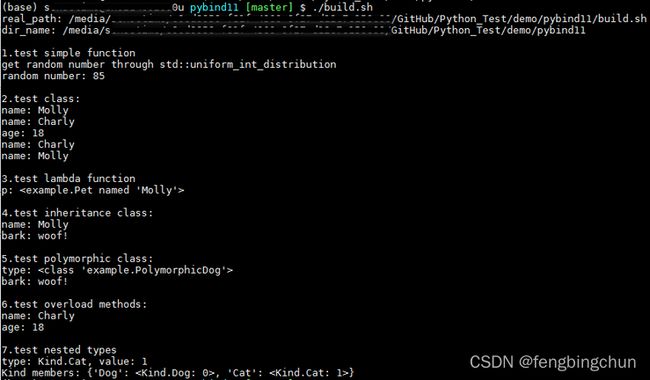pybind11介绍
pybind11是一个轻量级的仅头文件库,主要用于创建现有C++代码的Python绑定,它的源码在https://github.com/pybind/pybind11,license为BSD,最新发布版本为2.9.1。
可将pybind11库视为Boost.Python的一个小型自包含版本(Think of this library as a tiny self-contained version of Boost.Python),其中剥离了与绑定生成无关的所有内容。pybind11依赖于python(2.7或3.5+)和C++标准库。
pybind11核心功能:pybind11可以将以下C++功能映射到Python
(1).函数接受和返回自定义数据结构(per value, reference, or pointer);
(2).实例方法和静态方法;
(3).重载函数;
(4).实例属性和静态属性;
(5).任意异常类型;
(6).枚举;
(7).回调;
(8).迭代器和范围(ranges);
(9).自定义运算符;
(10).单继承和多继承;
(11).STL数据结构;
(12).具有引用计数的智能指针如std::shared_ptr;
(13).具有正确引用计数的内部引用(Internal references with correct reference counting);
(14).可以在Python中扩展具有虚(和纯虚)方法的C++类。
pybind11支持的编译器:
(1).Clang/LLVM 3.3或更高版本;
(2).GCC 4.8或更高版本:注:编译2.9.1版本的test,GCC需要5以上版本
(3).Visual Studio 2015或更高版本。
pybind11的安装:
(1).通过conda,执行:conda install -c conda-forge pybind11
(2).通过pip,执行:pip install pybind11
更详细文档介绍参考:https://pybind11.readthedocs.io/en/stable/index.html
以下为测试代码:
include/funset.hpp:C++代码头文件
#ifndef PYBIND11_FUNSET_HPP_
#define PYBIND11_FUNSET_HPP_
#include
#define PYBIND11_API __attribute__((visibility ("default")))
PYBIND11_API int get_random_number(int min, int max);
struct PYBIND11_API Pet {
Pet(const std::string& name) : name_(name) { }
void setName(const std::string& name) { name_ = name; }
const std::string& getName() const { return name_; }
static int getAge() { return 18; }
std::string name_;
};
struct Dog : Pet {
Dog(const std::string& name) : Pet(name) { }
std::string bark() const { return "woof!"; }
};
struct PolymorphicPet {
virtual ~PolymorphicPet() = default;
};
struct PolymorphicDog : PolymorphicPet {
std::string bark() const { return "woof!"; }
};
struct Pet2 {
Pet2(const std::string& name, int age) : name_(name), age_(age) { }
void set(int age) { age_ = age; }
void set(const std::string& name) { name_ = name; }
int getAge() const { return age_; }
const std::string& getName() const { return name_; }
std::string name_;
int age_;
};
struct Widget {
int foo(int x, float y) { return 0; };
int foo(int x, float y) const { return 1; };
};
struct Pet3 {
enum Kind {
Dog = 0,
Cat
};
struct Attributes {
float age = 0;
};
Pet3(const std::string& name, Kind type) : name_(name), type_(type) { }
std::string name_;
Kind type_;
Attributes attr_;
};
#endif // PYBIND11_FUNSET_HPP_ src/funset.cpp:C++代码的实现,编译生成动态库或静态库
#include "funset.hpp"
#include
#include
PYBIND11_API int get_random_number(int min, int max)
{
fprintf(stdout, "get random number through std::uniform_int_distribution\n");
std::random_device rd;
std::mt19937 generator(rd());
std::uniform_int_distribution distribution(min, max);
return distribution(generator);
} example.cpp:生成python接口,编译生成动态库,若Python为3.8,则动态库名字为:example.cpython-38-x86_64-linux-gnu.so
#include
#include
// reference: https://pybind11.readthedocs.io/en/stable/
namespace py = pybind11;
// If you prefer the py::overload_cast syntax but have a C++11 compatible compiler only,
// you can use py::detail::overload_cast_impl with an additional set of parentheses
template
using overload_cast_ = pybind11::detail::overload_cast_impl;
// #define PYBIND11_MODULE(name, variable): name: module name; variable: a variable of type `py::module_` which can be used to initialize the module
PYBIND11_MODULE(example, m) {
m.doc() = "pybind11 example plugin"; // optional module docstring
// 1. bindings for a simple function
m.def("get_random_number", &get_random_number, "A function that get random number", py::arg("min"), py::arg("max"));
// 2. bindings for a custom C++ data structure: class or struct
// class_ creates bindings for a C++ class or struct-style data structure
py::class_(m, "Pet")
// init() is a convenience function that takes the types of a constructor’s parameters as template arguments and wraps the corresponding constructor
.def(py::init())
.def("setName", &Pet::setName)
.def("getName", &Pet::getName)
// Static member functions can be bound in the same way using class_::def_static()
.def_static("getAge", &Pet::getAge)
// 3. Binding lambda functions
.def("__repr__",
[](const Pet &a) {
return "";
}
)
// We can also directly expose the name_ field using the class_::def_readwrite() method.
// A similar class_::def_readonly() method also exists for const fields
.def_readwrite("name", &Pet::name_);
// 4. class inheritance
// There are two different ways of indicating a hierarchical relationship to pybind11:
// the first specifies the C++ base class as an extra template parameter of the class_:
py::class_())
.def("bark", &Dog::bark);
// // Alternatively, we can also assign a name to the previously bound Pet class_ object and reference it when binding the Dog class
// py::class_ pet(m, "Pet");
// pet.def(py::init())
// .def_readwrite("name", &Pet::name);
// // Method 2: pass parent class_ object:
// py::class_(m, "Dog", pet /* <- specify Python parent type */)
// .def(py::init())
// .def("bark", &Dog::bark);
// 5. class polymorphic
// In C++, a type is only considered polymorphic if it has at least one virtual function and pybind11 will automatically recognize this
py::class_(m, "PolymorphicPet");
py::class_(m, "PolymorphicDog")
.def(py::init<>())
.def("bark", &PolymorphicDog::bark);
// Again, return a base pointer to a derived instance
// Given a pointer to a polymorphic base, pybind11 performs automatic downcasting to the actual derived type
m.def("pet_store2", []() { return std::unique_ptr(new PolymorphicDog); });
// 6. Overloaded methods
py::class_(m, "Pet2")
.def(py::init())
.def("set", static_cast(&Pet2::set), "Set the pet's age")
.def("set", static_cast(&Pet2::set), "Set the pet's name")
.def("getAge", &Pet2::getAge)
.def("getName", &Pet2::getName);
// If you have a C++14 compatible compiler, you can use an alternative syntax to cast the overloaded function
// py::class_(m, "Pet2")
// .def("set", py::overload_cast(&Pet2::set), "Set the pet's age")
// .def("set", py::overload_cast(&Pet2::set), "Set the pet's name");
// If a function is overloaded based on constness, the py::const_ tag should be used
py::class_(m, "Widget")
.def("foo_mutable", overload_cast_()(&Widget::foo))
.def("foo_const", overload_cast_()(&Widget::foo, py::const_));
// 7. Enumerations and internal types: nested types
py::class_ pet(m, "Pet3");
pet.def(py::init())
.def_readwrite("name", &Pet3::name_)
.def_readwrite("type", &Pet3::type_)
.def_readwrite("attr", &Pet3::attr_);
py::enum_(pet, "Kind")
.value("Dog", Pet3::Kind::Dog)
.value("Cat", Pet3::Kind::Cat)
.export_values();
py::class_(pet, "Attributes")
.def(py::init<>())
.def_readwrite("age", &Pet3::Attributes::age);
} build.sh:编译cpp文件生成动态库
#! /bin/bash
real_path=$(realpath $0)
dir_name=`dirname "${real_path}"`
echo "real_path: ${real_path}"
echo "dir_name: ${dir_name}"
# build funset static library
# g++ -O3 -Wall -static -c -std=c++11 src/funset.cpp -Iinclude
# ar -r libfunset.a funset.o
# build funset dynamic library
g++ -O3 -Wall -shared -fPIC -std=c++11 -o libfunset.so -c src/funset.cpp -Iinclude
g++ -O3 -Wall -shared -std=c++11 -fPIC $(python3-config --includes) example.cpp \
-o example$(python3-config --extension-suffix) \
-L./ -lfunset \
-I../../src/pybind11/include \
-Iinclude
# # delete funset library, example.cpython-38-x86_64-linux-gnu.so has contained relevant export symbols
rm libfunset*
python test.pytest.py:测试导出的python接口
import example
print("\n1.test simple function")
print("random number:", example.get_random_number(min=1, max=100))
print("\n2.test class:")
p = example.Pet("Molly")
print("name:", p.getName())
p.setName("Charly")
print("name:", p.getName())
print("age:", p.getAge())
print("name:", p.name)
p.name = "Molly"
print("name:", p.name)
print("\n3.test lambda function")
print("p:", p)
print("\n4.test inheritance class:")
p = example.Dog("Molly")
print("name:", p.name)
print("bark:", p.bark())
print("\n5.test polymorphic class:")
p = example.pet_store2()
print("type:", type(p))
print("bark:", p.bark())
print("\n6.test overload methods:")
p = example.Pet2("Molly", 10)
p.set("Charly")
p.set(18)
print("name:", p.getName())
print("age:", p.getAge())
print("\n7.test nested types")
p = example.Pet3("Lucy", example.Pet3.Cat)
print(f"type: {p.type}, value: {int(p.type)}")
print("Kind members:", p.Kind.__members__)执行结果如下:
GitHub:https://github.com/fengbingchun/Python_Test
